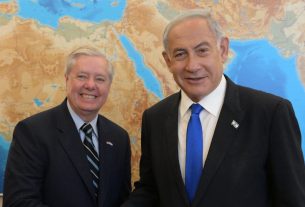When he announced the impending release of Israeli-American hostage Edan Alexander earlier this week, President Donald Trump posted, “Hopefully this is the first of those final steps necessary to end this brutal conflict. I look very much forward to that day of celebration!”
He’s not alone.
More than 19 months after Hamas’ Oct. 7, 2023, attack on Israel, which launched the war in Gaza, calls are mounting for the war to end, even among those who once supported it.
Trump has said he wants an end to the war. Polls of Israelis consistently show that most prefer a negotiated end to the fighting that releases the remaining hostages. Polling of American Jews indicates that most do not support Israeli Prime Minister Benjamin Netanyahu’s plan to continue the war. A poll of Palestinians last year found only a minority — and just 36% in Gaza — support “armed struggle.”
Still, the fighting has gone on. So we asked a collection of experts — Israelis, American Jews and Palestinians from across the political spectrum — to describe a realistic pathway to ending the war. Here’s what they said.
Some responses have been edited for length.
Ahmed Fouad Alkhatib, head of Realign For Palestine, the Atlantic Council
The tacticalization of this war has devolved into an utter disaster for both the Palestinian civilian population and, very likely, the surviving Israeli hostages that remain in Hamas’s captivity…
What is desperately needed is to introduce new players on the ground beyond Israel and Hamas; that would entail the immediate formation of a joint Arab, and international policing force with the involvement of elements of the Palestinian Authority’s security services to go into zones currently held by the Israeli military inside the Strip.
Simply pulling out the Israeli military from the Gaza Strip without any viable alternative to hold those zones will automatically mean the return of what remains of Hamas to controlling the lives of 2 million Palestinian residents of the territory.
The war must end immediately… And there must be an immediate activation of small beachheads throughout Gaza to create Hamas-free zones from which the Strip’s recovery and hopefully, political transformation and rejuvenation in the transitional period can begin.
Dahlia Scheindlin, Israeli political analyst and Haaretz columnist
There is a realistic pathway to ending the war and it’s called the original [U.S. envoy Steve] Witkoff-brokered agreement, which Israel broke. The government now says it wants to go back to that, but I believe this refers to the bastard version — revised after Israel broke the first — which was stillborn.
Why did Israel break the first [ceasefire, in March]? It’s a reasonable pathway forward. I suppose there’s no way around the reality that the Trump administration holds all the cards for pushing the sides back to that.
Dan Shapiro, former ambassador to Israel under President Barack Obama
Trump helped create this problem with his unserious Gaza Riviera proposal. That tempted the far right in Israel to think he would support Israeli reoccupation of Gaza. Coming out of his cozy meetings in the Gulf and skipping Israel, that seems unlikely.
The priority, as most Israelis believe, should be to get all the hostages home with their families. Edan Alexander’s release could be used as momentum for a larger deal that brings everyone home and ends hostilities. That deal should be coupled with a commitment from Arab states to use their financial, political and military assets to exile Hamas leaders and fighters from Gaza and destruction of their weapons as a condition for Gaza’s reconstruction. Trump needs to use the goodwill he now has in the Arab world to get the Arab states to step up to that responsibility.
David Friedman, former ambassador to Israel under Trump
Other than militarily, I’m not aware of any means to force Hamas out of Gaza. And if Hamas doesn’t leave, the trauma of Oct. 7 will just recur every five years or so (perhaps even more often). In other words, Israel will effectively have conceded that it cannot protect its citizens.
That would be untenable — something unacceptable to any nation. I believe that Hamas can be and must be eradicated. And I think there is beginning to emerge a means to do that while offering protection to civilians: The humanitarian aid and safe zone plan proposed by Israel and the United States.
It’s a path that I believe Israel must take (and one I believe most Israelis support when the issue is properly presented). By the way, I believe that President Trump endorses that approach.
Einat Wilf, author and former member of Knesset
The question is not whether one wants the war to end. That is easy and obvious. The question is how? Will this war end with Hamas and its ideology in control of all of Gaza’s territory? With billions of dollars flowing in?
Or will it end, as it should, with the unconditional release of hostages, surrender of Hamas, and the beginning of a process to transform the destructive ideology of Palestinianism into one that wants to build for the Arabs rather than destroy what the Jews have built?
Perhaps a viable path would be to designate an area in Gaza where, absent collective Gazan and Palestinian and Hamas surrender, individuals would be able to surrender. This would be the only area where Israel supplies [aid] — the rest will be a war zone for those who refuse to surrender…
Ultimately, moments of destruction and ruin, both in personal and collective lives, can become moments of growth and transformation, but only if one accepts the connection between the ideology and attitudes that led to the destruction and ruin.
Eylon Levy, former Israeli government spokesman
The agonizing debate is about whether this is the Last Gaza War, or the Penultimate Gaza War. Many think it’s now or never to bring down the regime threatening more 10/7s. Many others say Hamas has checkmated us with the hostage crisis, let’s pay the ransom and bring down Hamas later.
But nobody thinks we can reconcile with this jihadist regime controlling Gaza again. Israelis understand that if we end the war to free the hostages, the next war is a matter of time. You can’t sweep the problem under the rug.
Ghaith al-Omari, senior fellow, Washington Institute for Near East Policy
Given political dynamics on both sides, it is unlikely that domestic public opinion will bring about a quick end to the war. External intervention will probably be needed. On the Israeli side, a clear position from President Trump regarding ending the war will certainly impact Netanyahu’s calculus.
But the administration will only call for an end of the war if Israel’s key demands that Hamas releases the hostages, is disarmed and is no longer in charge of Gaza – possibly through the exile of its leaders from the Strip — are met.
The only way to pressure Hamas into making these moves is for an explicit, unified demand from key Arab states, including Hamas’ backers in Qatar. Given the tremendous credit the president has accrued in his current visit to the Gulf, the United States may be well poised to coordinate such a position from Arab states.
Jeremy Ben-Ami, president, J Street
This week’s freeing of Edan Alexander from Hamas captivity demonstrates that diplomacy is the only path forward to end the war and guarantee the safe release of all remaining hostages held in Gaza.
The Israeli government and Hamas should reach an immediate agreement to end the fighting, release the hostages and surge aid into Gaza. Then, Israel needs to agree to a plan for post-war governance, security and redevelopment with its Arab neighbors that paves the way to full regional normalization, long-term security and Palestinian statehood.
It is time for President Trump and the Gulf states to lean in and use the leverage necessary to bring this war to an end, to get the hostages home and to get aid to the people of Gaza. Enough is enough.
Tamar Hermann, senior research fellow, Israel Democracy Institute
A majority of Israelis support ending the war only if doing so results in the return of all Israeli hostages. The continuation of the war, in and of itself, is not considered unacceptable by most Israelis — despite the situation in Gaza. This, in my view, is because unlike the situation for Palestinians, especially in Gaza, the war is barely felt by the Israeli general public.
In fact, many — including some rather dovish military experts —are saying quite openly that Hamas must be completely removed from the equation.
Netanyahu is not concerned about being toppled over the war’s continuation. On the contrary, ending the war could trigger internal pressures within his coalition…
So what could stop the war? Unfortunately, not much at the moment, I’m afraid.
First and foremost, significant pressure must be exerted on Hamas to release all hostages and to accept the presence of an international force to control the Gaza Strip. Second, some form of “good news” regarding even partial normalization with Saudi Arabia could make a difference…
Yardena Schwartz, journalist and author, “Ghosts of a Holy War”
The vast majority of Israelis want this war to end in exchange for the release of the hostages. The inconvenient truth is that Hamas agreed to this framework long ago. Netanyahu has openly and repeatedly expressed his refusal to end the war, even if the hostages are released.
It was Netanyahu, not Hamas, who reneged on the ceasefire deal in March. “Victory” he claims, is more important than the hostages. Yet 19 months into a war that has failed to defeat Hamas, it is time to recognize that the military pressure Netanyahu claims will free the hostages has in fact killed more than three dozen of them.
The only way Hamas will cease to control Gaza is if an alternative government is in place to rule it — something Netanyahu has consistently rejected. Israeli security officials have said that without a political solution for Gaza, no military solution will be successful.
It’s time for American Jews to stand with the hundreds of hostage relatives, dozens of released hostages and the majority of Israelis in demanding from the Israeli government: bring our hostages home and end this war.
Yossi Klein Halevi, senior fellow, Shalom Hartman Institute
Like a strong majority of Israelis, I believe we need to prioritize saving the hostages over defeating Hamas. It’s not only a question of saving lives; it’s also a matter of salvaging the Israeli ethos of mutual protection, which is one of the factors strengthening our motivation to fight for this country.
And so the way to end the war is straightforward: all the hostages for a long-term ceasefire. Then I believe we should focus our attention on destroying Iran’s nuclear facilities, which is the real existential threat we face. Even if it means defying Trump and going it alone.
Keep Jewish Stories in Focus.
(JEWISH REVIEW) has documented Jewish history in real-time for over a century. Keep our journalism strong by joining us in supporting independent, award-winning reporting.




